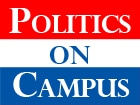By Annie Paul Unigo Campus Rep at Utah Oct. 30, 2008 At a recent event for the U’s Honors cohort of the Community Leadership Scholars at the State Capitol, Josh Romney, the son of former presidential candidate Mitt Romney, said that the media, as liberal as it is, shifted its attention during this past year’s rallies from the issues of Iraq to immigration to foreign policy to, more currently, the economy — as if suddenly the previous issues didn’t matter anymore.
| Behind the cardboard cutouts of the candidates, students posed the questions and comments they wanted to have answered and discussed during a Crimson Café in October, an event where groups of interested students watched the debate together. |
And while it’s true that the U seems to be isolated in regards to its political atmosphere, students here also didn’t quite follow these trends when letting their voices be heard. In fact, they didn’t have much of a voice at all. The only way I got to know about their opinions and what truly matters to them is by interviewing them for this article, and the only way any interested student may get to know his classmates’ views may just as well be by attending the meetings of our College Republicans and College Democrats chapters. Yet even though there’s no clear way to know what the student sitting next to me thinks (or what your future classmates — if you’re a prospective student interested in coming here — hold dear to their heart) lucky for you, I summarize here the main issues they feel they want their candidate of their choice to work on come January and the next four years. Students had plenty to say about the candidates’ points of view and how those opinions might impact their lives if elected. Obama’s supporters mainly like his health care policy and desire to end the war. McCain supporters agree more with his foreign policy and contend that Obama’s economic plans will merely act as a socialist’s answer to solve the ever-widening gap between the poor and the wealthy. When it comes to issues Obama supports, Amanda, a junior double-majoring in Middle East Studies and Arabic, said that Obama’s tax breaks and health insurance proposals would yield the greatest impact especially to “most students [who] are uninsured and can’t afford health care.” Others, like sophomore Suzie who’s majoring in Biology, contend that raising taxes to those who can afford it would be vital. (Obama’s current plan calls for a tax increase to those who make at least $200,000 a year.) Senior Collin Brooksby Hafen, a religious studies major, argues that “if we really care about higher education, we must make it easier for students who study fulltime rather than work full-time [and must therefore forego healthcare] to continue their studies [and] not put roadblocks in front of them.” In general, education funding and energy reform were prominent issues according to the student Democrats polled. On the other hand, those who support McCain focus mainly on his foreign policy and energy plans. For example, Trevor*, a senior chemical physics major, argues that, if elected, McCain should focus on “improving our relations with the UN and get[ting] the U.S. on board with the Kyoto protocol and alternative energies.” Then there is Aaron*, a junior and a Middle-East Studies and Arabic major, who has a very detailed plan for McCain. His outline goes a little something like this: after increasing the military budget, making famous any pork barrel project that comes to his desk, and commissioning a bi-partisan committee to develop ideas that would stimulate the economy, McCain should begin drilling for oil in rich states. Michael Goleniewski, a junior and a computer science major, adds that he should also visit the troops in Iraq to show his support if he becomes elected as well. In addition, most students felt that McCain’s most relevant issues for students in college that will have a major impact on how we look at and deal with politics in the future are his tax cuts, reducing Medicare growth and “possibly end the situation in Iraq,” as Michael put it. Others include energy independence and a realistic foreign policy. Then when referring to the seemingly never-ending dilemma in Iraq, Aaron said McCain would be a strong leader. “Realists and more of the military community will see in McCain an experienced leader who will continue to make the U.S. safe,” Aaron concluded. Yes, the U is a great school where (thankfully, to some) the typical trends of its home state aren’t observed as much. Yet, while we do have political groups where students get involved and raise awareness about issues that matter to them (they’re not that many, by the way), we are not that involved in politics as we probably should be. You can find that at least 60-70 percent of any given class watched any of the debates (if not all), and many have already voted in the early voting station on campus. We do talk politics and try to keep up, but that’s about as far as it goes — merely watching and briefly discussing—no real “activism,” at least none that I have seen.
* These students didn’t provide with me their last names, as they didn’t feel like wanting to be easily identified.
